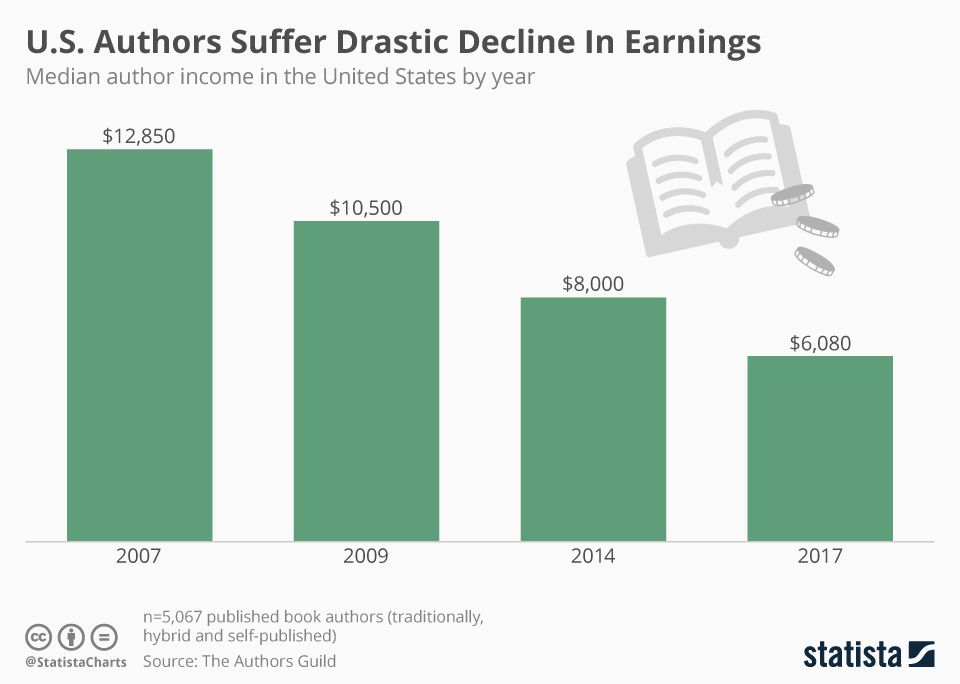How much famous authors really make
Ad
When we imagine the life of a famous author, we picture royalty checks cascading into their bank accounts, book signings packed with adoring fans, and Hollywood executives negotiating for screen rights. It’s a comforting image of solitary authors rewarded handsomely for their words. But peel away the gloss, and the reality of author earnings reveals both the staggering heights a handful achieve, and the sobering struggles most endure.
The Economics of Authorship
Traditional publishing has a rigid royalty structure. Authors typically earn 8–15% royalties on print books, around 20–25% for e-books, and 25% for audiobooks. Put bluntly, if you buy a $20 hardcover, the author might receive just $2 of that. Yes! The person who created the very product takes home as tiny as a peanut.
In contrast, self-publishing platforms like Amazon’s Kindle Direct Publishing (KDP) offer up to 70% royalties on e-books priced between $2.99 and $9.99. That means a $9.99 e-book can put nearly $7 directly in the author's pocket. For entrepreneurial authors, this can outpace traditional contracts, but only if they can build visibility without a publisher’s marketing machine.
Author Salary vs. Advance Payments
The average income of authors is often misunderstood. Newbies in traditional publishing setup typically secure advances between $5,000 and $15,000. Established names may negotiate six- or seven-figure deals, but advances are not free money; they’re a loan against future sales. If your book doesn’t “earn out,” you may never see another royalty check.
This is why author salary is misleading. Authors are not on payroll. Their earnings are unpredictable, lumpy, and subject to the whims of the market. A so-called “salary” might look like a modest advance, followed by years of uncertainty.
Bestselling Author Income
At the very top of the food chain, numbers dazzle. James Patterson earns roughly $80–100 million annually, fueled by relentless output and co-authored series. J.K. Rowling brings in $50–100 million annually, but much of that comes from the Harry Potter empire - films, merchandise, and theme parks. Similarly, Stephen King comfortably nets $20–30 million a year, with Hollywood keeping his backlist alive.
Then there are phenomena like E. L. James, who earned $95 million in a single year from Fifty Shades, or Dan Brown, who pocketed tens of millions from The Da Vinci Code.
These are not benchmarks. They are lottery wins.
As per a survey done in Author's Guild, U.S. authors have faced a steep decline in earnings. Median incomes dropping from $12,850 in 2007 to $6,080 in 2017. With literary fiction hit hardest, while self-published authors saw income nearly double since 2013 but still earn 58% less than traditionally published peers.

Average Author Income is a Harsh Reality
For every celebrity novelist, there are thousands of mid-list and debut authors. Surveys by the Authors Guild reveal the median income for full-time authors is around $20,000–25,000 a year. That's barely above poverty line in most developed nations. Many never recoup their advances.
This is the publishing industry inequality we rarely discuss: a system that glorifies millionaires while squeezing the middle class of writers. The reality is that most authors earn less than minimum wage from their books, even while their publishers turn steady profits.
Author vs. Publisher Profits: Who Really Wins?
The brutal truth is that the publishing industry runs on a winner-takes-most economy. Publishers collect the lion’s share, distributors take their cut, and the author, who's the source of the content, ends up last in line. Author vs. publisher profits is a battle that authors almost always lose.
Self-publishing can reverse that equation, but it shifts the burden of marketing, visibility, and credibility onto the author’s shoulders. You keep more money per book but only if you can sell them.
Beyond Book Sales is The Real Money Machine
So, it appears that even the wealthiest authors don’t rely solely on book sales. The true fortunes lie in adaptations, licensing, and franchising. Rowling’s wealth isn’t just from paperbacks; it’s from Warner Bros., Universal Studios, and endless merchandise. Patterson is less an author than a brand. His name gets stamped across thrillers, TV deals, and young adult spin-offs.
If you want to know how much money a famous author makes from one book, the answer is often: surprisingly little. The real money comes when that book becomes a business.
The Reflection We Avoid
So, how much do authors make? The famous few millions. The rest, barely a living. The average income of authors is a sobering contrast to the myth of the wealthy writer.
Authorship is art, yes. But publishing is commerce. If you dream of authorship, you must confront this duality: your words may shape minds and touch souls, but whether they pay your bills depends on more than talent. It depends on marketing, timing, branding, and sometimes sheer luck.
And here’s my sharpest conclusion: until the industry confronts its inequality and creates fairer structures, “famous author earnings” will remain the exception, not the rule.
The next time you pick up a book, ask yourself. Who’s really profiting from your loyalty, the publisher or the writer?
